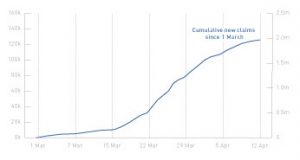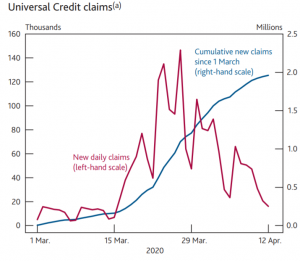1. Understand the impact on your portfolio
You could hypothesize when looking at the high-level trends, that we are on the cusp of an economic recovery, however the credit market is lagging against the real economy. To this point we haven’t seen the real impact on the credit market.
2. Look at more frequent time-trends
In another example, claims for Universal Credit have picked up considerably since March. See Figure 1:

Figure 1
However, if you then look down to a daily view, you can see that daily trends are trending downwards. Figure 2 identifies this.

Figure 2
3. Assess household level impact
As well as regional Another example would be house prices. On a regional view house prices show a 20% reduction this year. But individual localities and regions give a better quantifiable figure and in fact, some areas could see as little as 6% reduction.
4. Analysis needs assessing against scenarios
The final example is ensuring you are comparing performance and testing the analysis. By appending your portfolio against the market, or analysis against demographic profiles for example (like Experian’s Financial Strategy Segments (FSS)), can give you a deeper understanding of risk, including if you are overconcentrated in any specific area. Benchmarking can also give you a solid view of how you are performing, versus the whole of market. These are just a few examples of many.
More granular analysis, and forensic understanding, is imperative. But, another equally important factor is the quality of data being used for the analysis.
5. Breadth of data is essential
Statistical data such as the ONS Family Spending Survey, which measures a customer’s affordability against a set of modelled averages – and is relied on by so many lenders – just won’t be a suitable metric in these rapidly changing times. Being able to access more detailed insight, such as behavioural trends derived from bank transaction data, can augment your understanding and give a true view of what’s affordable.
6. Recency of data
It is imperative you are using the most up-to-date insight in order to perform analysis. In unprecedented times like these, disrupters such as the coronavirus is not following a neat timescale of evolution. As such, being able to access data that is up-to-date, and current can be imperative to helping you mitigate risks in near real-time.
7. Quality of data
It’s a well-coined phrase the need for a single customer view, but truly – its important. At Experian, we receive multiple records for the same consumer from different sources. Even though the records are for the same person, variations in names and addresses, misspellings, or inaccurate dates of birth, as well as the use of different formats, mean the data items might not be an exact match. Our unrivalled technology cleanses the data frequently, ensuring the quality is robust, and you access the best possible 360-degree view of your customers.
Keeping a close eye on the market is imperative. There is no question that we are in a constant flux of change. At Experian we are able to offer support, and services – including Consultative support – to help you navigate the challenges and changes, as they happen.
Each month we are committed to sharing an overview of how the market has, and is changing – covering economic, consumer and commercial credit trends. Sign up here.
We are also working with many industry leaders to perform bespoke, and granular scenario testing to give a better view of portfolio risk, helping to drive strategies for change that will protect the near future. If you want to understand more about how we can help your business manage economic exposure, please contact us.
